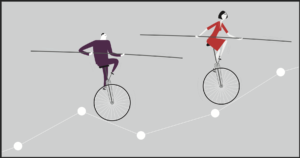Recently, I was in conversation with a few fellow coaches, and one of the members asked, “Describe a time that you took a stand and it cost you?”
Out of the six of us in the conversation, all but one shared a story that cost them their job. Wow!
And before that, I read a blog from another friend who asked the opposite question: “Have you ever done your very best to blend and morph to meet the mentalities in a room instead of showing up as 1000% yourself?
So, which choice is a cost and which is a benefit?
I have learned over the years that when “we” are responsible, rather than “I” am responsible, we all get a better outcome.
And the fantastic days are when team members are engaged and authentic in creating the best day. And the ‘not so good days’ are when something is going awry, and no one says anything.
Yet, there is no guarantee that the result of being fully engaged and authentic will result in a fantastic day or result in taking a stand that costs you.
So instead, many of us (perhaps most?) choose silence. Does this come from a place of respect for the leader? After all, it is “their meeting”; it’s up to them to “fix it.” And when there is a series of “it’s up to him or her or them to fix it,” we can quickly go from a ‘not so good meeting,’ to a ‘not so good day’ or week and ultimately a ‘not so good outcome’ for the business.
All of us can be both leaders and followers in our daily lives. And sometimes, we need to step up and take a leadership role in the moment, even when we are not the official leader. The next time you are in one of these moments, here are a few questions to consider as you perform a cost/benefit analysis of the situation:
- If something is amiss in a meeting or a moment, and I stay silent, what is the potential cost to me, the group, or the business?
- If something is amiss and I speak up, what is the potential cost to me, the group, or the business?
- In a fair and bold cost/benefit analysis, what is the best and bravest choice for me to make?








 The initial results of my Pivot are excellent. I feel I have much greater clarity regarding the next 3-5 years..
The initial results of my Pivot are excellent. I feel I have much greater clarity regarding the next 3-5 years.. 